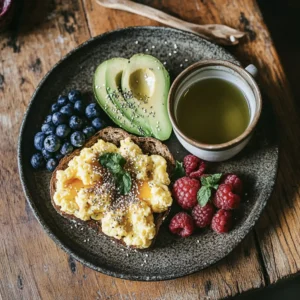
Breakfast DTI
Boost your energy with a balanced Breakfast DTI packed with protein, healthy fats, and fiber. Avoid crashes and stay full longer with these smart tips!
Ingredients
High-Quality Protein for Long-Lasting Fullness
- Protein is a game-changer when it comes to avoiding mid-morning crashes. It keeps you satisfied longer stabilizes blood sugar levels, and helps with muscle repair. Consider adding:
- Eggs – A powerhouse of protein healthy fats, and brain-boosting choline
- Greek yogurt – A creamy protein-rich option that also supports gut health
- Cottage cheese – Packed with protein and calcium while being low in sugar
- Tofu or tempeh – A great plant-based alternative high in protein and essential amino acids
- Nut butters – Almond peanut, or cashew butter adds a satisfying dose of protein and healthy fats
Healthy Fats to Keep Energy Levels Steady
- Skipping fats in the morning can leave you feeling hungry too soon. Adding healthy fats helps slow digestion keeping energy levels stable while improving brain function. Some great choices include:
- Avocado – Rich in heart-healthy monounsaturated fats and fiber
- Nuts and seeds – Walnuts chia seeds, and flaxseeds add crunch and nutritional benefits
- Coconut oil or olive oil – A smart choice for cooking or drizzling over breakfast dishes
- Full-fat dairy – If you tolerate dairy options like whole-milk yogurt provide beneficial fats
Complex Carbohydrates for Lasting Energy
- Not all carbs are the same. Choosing slow-digesting fiber-rich carbohydrates ensures a steady release of energy, preventing blood sugar spikes and crashes. Smart carb choices include:
- Oats – A fiber-packed grain that supports digestion and sustained energy
- Quinoa – A high-protein grain alternative with a rich texture
- Sweet potatoes – A nutrient-dense naturally sweet option that pairs well with eggs or nut butter
- Whole grain bread – A better choice than refined white bread for lasting energy
Antioxidant-Rich Fruits and Vegetables
- Adding a variety of colorful fruits and vegetables to your breakfast provides essential vitamins minerals, and antioxidants to protect against fatigue and inflammation. Some top picks include:
- Berries – Blueberries strawberries, and raspberries are high in vitamin C and fiber
- Bananas – A natural source of potassium that supports muscle function and hydration
- Spinach or kale – Easy to blend into smoothies or add to egg dishes for an extra nutrient boost
- Tomatoes and bell peppers – Great for adding natural sweetness and extra vitamin A
Hydration for Digestion and Mental Clarity
- Many people forget that hydration plays a huge role in morning energy levels. Starting your day with the right fluids can aid digestion improve focus, and prevent dehydration-related fatigue. Some great options include:
- Water with lemon – Refreshing hydrating, and packed with vitamin C
- Green tea or matcha – A natural source of caffeine and antioxidants for steady energy
- Herbal teas – A caffeine-free option that soothes digestion
- Protein smoothies – A great way to combine hydration with essential nutrients
Instructions
Choose Your Protein Base
- Start with a high-quality protein source to help stabilize blood sugar and keep hunger in check. Some great options include:
- Scrambled, poached, or hard-boiled eggs
- Greek yogurt or cottage cheese with no added sugar
- A protein smoothie with plant-based or whey protein
- A tofu or tempeh scramble for a plant-based alternative
- Pro Tip: If you’re making eggs or a tofu scramble, cook them in olive oil or coconut oil for added healthy fats.
Add Healthy Fats for Steady Energy
- Healthy fats are essential for brain function and lasting fullness. Choose one or two from this list:
- Half an avocado, sliced or mashed on whole-grain toast
- A handful of almonds, walnuts, or chia seeds sprinkled over your meal
- A drizzle of natural nut butter over oats or yogurt
- A spoonful of coconut or flaxseed oil blended into a smoothie
Incorporate Fiber-Rich Carbohydrates
- To sustain your energy levels and avoid blood sugar spikes, opt for slow-digesting, high-fiber carbs:
- Oats – Cook them into a warm bowl of oatmeal or use them in overnight oats
- Whole grain bread – A nutritious base for avocado toast or nut butter
- Sweet potatoes – Roast or mash them for a fiber-packed breakfast side
- Quinoa – A high-protein grain that pairs well with eggs or yogurt
Boost with Antioxidants and Micronutrients
- Adding fruits and vegetables gives your breakfast an extra dose of vitamins and minerals to support overall well-being. Try:
- Fresh or frozen berries for a natural sweetness
- Banana slices for potassium and quick-digesting carbs
- Leafy greens like spinach or kale blended into a smoothie or added to eggs
- Tomatoes and bell peppers for a savory breakfast option
Hydrate for Better Digestion and Focus
- Don’t forget to hydrate—morning dehydration can lead to sluggishness and brain fog. Pair your breakfast with:
- A glass of lemon water to kickstart digestion
- Green tea or matcha for a gentle caffeine boost
- A protein smoothie for hydration and nutrients in one
- Herbal tea if you prefer a caffeine-free option
Bringing It All Together
- Here’s a sample balanced breakfast to get you started:
- Scrambled eggs cooked in olive oil, served with avocado on whole grain toast
- A side of mixed berries for antioxidants
- A cup of green tea for hydration and steady energy
- Or, if you prefer a quick grab-and-go option:
- A protein smoothie with Greek yogurt, banana, oats, chia seeds, and almond butter
- A handful of nuts on the side for added crunch and nutrition
Notes
Nutrition Information (Per Serving)
- Calories: ~400
- Protein: 20g
- Carbohydrates: 40g
- Fiber: 8g
- Fat: 15g
- Sugar: 5g